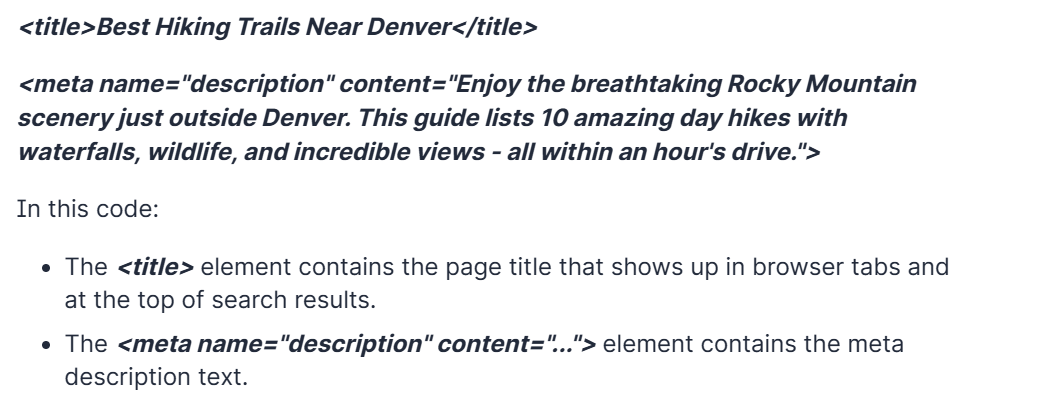Most business owners have tried a few SEO tips, but it's easy to get lost in the weeds of technical tips and feel overwhelmed by Google's complex algorithm.
The good news is that you don't need to fully understand how the algorithm works to rank on Google—you need to help Google and your target audience understand your content and do so alongside other best practices.
Optimizing your meta descriptions comes with a promise—higher, click through rate get-through rates.
How is that possible? In this simple guide, you'll learn how to improve your meta descriptions and get higher CTRs using strategies anyone can execute.
You just need to follow this guide.
What are Meta Descriptions
A meta description is a brief text that appears under a webpage's own title tag in search engine results. It gives users a preview of what the page is about. A good meta description can entice people to click through to your site.
For example, let's say you search for "best hiking trails near Denver" on Google. The top result might have a meta description like:
"Enjoy the breathtaking Rocky Mountain scenery just outside Denver. This guide lists 10 amazing day hikes with waterfalls, wildlife, and incredible views—all within an hour's drive."
That gives you a clear idea of what to expect from that webpage before clicking on it. It highlights the key benefits and makes you want to check it out.
This is what the code looks like:

Here is another example of a meta description in the SERPs:

See how it concisely covers the main points someone would want to know? A compelling meta description like that can improve click-through rates from search engines and Google loves to use them as featured snippets.
The ideal length is around 155-160 characters. Any longer and it may get cut off in search results. The meta description should use keywords naturally and sell the reader on clicking through.
Does this help explain what meta descriptions are and how to write good ones in your content writing process?
That’s exactly what you’ll learn to implement in this article. But first, let’s take a look at their importance.
How important are meta descriptions?
Meta descriptions are important for SEO for a few key reasons:
(i). They provide a concise summary of what a webpage is about.
This little snippet is shown in search engine results and can entice users to click through to your site if it's well-written and relevant to their search.
(ii). They influence click-through rates from search engines.
A compelling and descriptive meta description will make your listing more appealing than other results on the page. This can improve your organic traffic and numbers.
For example, let's say someone searches for "best dog toys for aggressive chewers." Two results show up, but one has a unique meta description, like:
"Our tough dog toys are designed for the most destructive chewers. Made from virtually indestructible rubber compounds and put through rigorous safety testing."
While the other result has a generic meta description. You'd probably click on the first one because the meta description tag directly promises toys suited for your aggressive chewer's needs.
(iii). Meta descriptions are a way to use your keywords and phrases.
By including relevant, searched terms in your description, you can increase your chances of ranking higher for those queries. However, be careful not to go overboard and stuff in too many relevant keywords.
(iv). They represent your brand voice.
Last but not least, they create a good first impression of your brand's voice and quality of content. A well-written meta description showcases your expertise on the topic.
As a good practice, always make sure you match the voice to your target audience.
How do I write a good meta description?
Writing a good meta description takes some thought, but following a few guidelines create meta descriptions can help maximize their effectiveness:
(i). Keep it concise and under 160 characters
Meta descriptions that are too long will get cut off in search results. Stick the description length to one or two concise sentences that preview the page content.
For example:
"Our premium dog food is made from high-quality, natural ingredients with no fillers. Formulated by vets for optimum canine nutrition and health."
(ii). Use your target keyword naturally
While you don't want to stuff the meta description, including your primary keyword makes it more relevant to that search.
Example:
"Get inspired with these easy vegetarian dinner recipes. Delicious meatless meal ideas for every night of the week."
(iii). Sell the content's benefits
An effective meta description should entice clicks by highlighting what's valuable or useful about the page content.
Example:
"Ten time-saving laundry tips that will change your life. Simple hacks to cut your laundry time in half while getting better results."
(iv). Match your brand's voice
The language and tone should fit your brand personality and audience. Get conversational for a casual brand, or keep it professional for a formal one.
(iv). Use call-to-action phrasing
Including tactical phrases like "Learn more" or "Find out how" can encourage more click-throughs.
Example:
"Struggling with anxiety? Learn behavioral techniques to manage anxiety and regain control over your mental health."
The best meta descriptions pique curiosity about the page content and compel people to click through for more information.
That’s the goal!
Next to write meta descriptions. When writing a compelling meta description, there are several things to avoid:
(i). Avoid double quotation marks in descriptions
Double quotation marks can make your meta description appear cut off or truncated in search results. Instead, use single quotes or skip quotation marks altogether. This will ensure your entire meta description length is visible.
(ii). Avoid duplicating meta descriptions
Duplicate and different meta descriptions across multiple pages can confuse search engines and users. It makes it harder for users to differentiate between pages in search results.
Each page should have a unique, relevant meta description that accurately reflects its content.
(iii). Include compelling ad copy in your description
Your meta description is like an advertisement for your page's content, so craft it carefully.
Use persuasive language and highlight the page's unique value proposition or key benefits.
For example, instead of "This page discusses writing meta descriptions well," try "Learn how to write compelling meta descriptions that boost click-through rates."
Why Won't Google Use My Meta Description? Final Thoughts.
A 2020 Ahrefs study on meta descriptions found that:
- Only 74.98% of top-ranking pages have a meta description — which is a missed opportunity given they factor into search rankings.
- Google is 65.62% more likely to rewrite meta descriptions for long-tail keywords over fat-headed ones.
- Google rewrites meta descriptions 62.78% of the time.
The stats above tell us that Google may not use your meta description for search engine rankings for a few reasons.
First, the study found that Google rewrites meta descriptions a whopping 62.78% of the time. So in most cases, Google doesn't stick to the exact meta description you provide.
Instead, they craft their snippet based on what they think best summarizes the page for that particular search query.
Second, Google is more likely to rewrite your meta description if the search query involves a long-tail keyword (65.62% more likely) compared to a broad, head term. Long-tail keywords are more specific, so Google may tailor the snippet to better match that narrower search intent.
Lastly, around 25% of top-ranking pages don't even have a meta description specified. In those cases, Google has no choice but to automatically generate a snippet from the page content.
It turns out that Google wants to provide the most relevant and descriptive search snippets for users. While they may use your meta description sometimes, they won't be shy about rewriting it or generating a new one if they think it better matches what the searcher is looking for.
The key takeaway here then becomes, that there is no need to be obsessed over cramming keywords into your meta descriptions. Focus on writing clear, compelling snippets that accurately preview your page content.
But also don't be surprised if Google rewrites or replaces your meta descriptions regularly based on the search queries.














 Download
Download